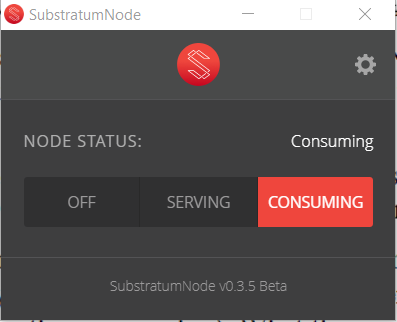
Source: Substratum
Privacy-conscious Internet users are likely familiar with TOR, a free software that provides users with anonymous and private web browsing through a network of computer nodes. Privacy advocates have long sworn by it, citizens of countries with totalitarian or authoritarian governments stake their lives on it, and journalists have used it to break news stories or perform anonymous research while working on hard-to-break cases. It is a key element for facilitating trade on the dark web, with criminals and law enforcement personnel using it in their cat-and-mouse games.
Substratum is a peer-to-peer computer network built on the Ethereum blockchain that allows anyone to earn cryptocurrency by sharing their computing resources and that also allows TOR-like privacy browsing for anyone logged into the network. This could very well be the next-generation Internet technology privacy advocates are looking for.
Substratum: What's the Big Idea?
Substratum's big idea is to decentralize the Internet. They're not the first to think of it, but they may be the first to roll out a practical and workable solution that is ready for mass consumption. The idea is based on the founding principles of the Internet itself. From the moment of ARPANET's conception, which is the precursor to the modern World Wide Web, the Internet was designed to be peer-to-peer and decentralized. But big corporations and big governments wanted to control it, and there is a massive fight to maintain the original features of the Internet—including peer-to-peer, decentralization, and net neutrality—all around the world. Substratum is on the front line of this battle.
While the idea is a grand idea, the devil is in the details. How will Substratum accomplish the goal in turning the Internet back into a decentralized peer-to-peer network of computer nodes? Essentially, they want to provide users with the software to operate a network node from anywhere in the world on a personal computing device and pay those users with cryptocurrency for doing so. Unfortunately, their white paper is light on the details.
In order to deliver this big idea to the world's Internet users, Substratum operates with the following essential components:
- Web hosting
- Network nodes
- A domain name system
- The Substrate token
- Advanced cryptography
- CryptoPay wallet
- And a decentralized exchange
Decentralized Web Hosting
Substratum web hosting is based on a decentralized network using a solution designed to host websites without a centralized web hosting service. Files are stored on network computers and retrieved when requested by a web browser. This is performed through advanced compression algorithms, machine learning, and geolocation in order to retrieve files from nearby nodes for web browsers requesting them. Each website hosted on the network will be controlled through a CPanel-type interface with a full set of language options that include HTML, CSS, PHP, MySQL, JavaScript, ASP, and Python. Ruby on Rails support is expected in the future.Additionally, Substratum promises to be compatible with the current Domain Name System (DNS) with additional capabilities that allow it to retrieve websites faster and with less latency due to its decentralized nature. Its unclear whether they'll include any type of domain registration service or an alternative DNS.
Within the network, every node will store different information, which will rotate throughout the network allowing user anonymity and privacy without sacrificing speed and connectivity. If it works as expected.
The Distributed Internet
In order to run a node on the network, users download the Substratum software and tell it how much CPU, GPU, and RAM to use. They can also select what days of the week and times to allow the network to access their computing resources. The software will open up the necessary ports for the user and, with the CryptoPay wallet installed, Substratum can pay users for their computing resources. That includes any CPU, GPU, or RAM usage as well as the resources to host websites and serve them up to web browsers.
SubstratumNode runs on Mac, Windows, and Linux. They also have a developers kit so developers can develop apps on top of the system and sell them through the Substratum store.
Substrate: What's In Your CryptoPay Wallet?
The Substratum cryptocurrency is called Substrate. The ticker symbol is SUB. As of this writing, the token is trading at 0.104264. Like a lot of cryptocurrencies, it's down from the high of $3.25 on January 9, 2018. Its market cap is $39,935,153, and the circulating supply is 383,021,000.

Source: CoinMarketCap
The cool thing about the Substratum Network is they plan to run multiple blockchains, each presumably for different purposes, but, again, their white paper has no details on this plan.
When users download the software, which is currently in early beta, they'll be paid in Substrate for their contributions to the network. The cryptocurrency is measured in Substrate and Atoms, which correlate to dollars and cents—nominally, but not necessarily in value—in U.S. dollars. So, if a user earns 2.50 SUB, that equates to 2 Substrate and 50 Atoms.
The CryptoPay wallet can be used to store, transfer, or spend cryptocurrencies and will be compatible with USD, EUR, and GBP fiat currencies. The plan is to allow CryptoPay as a checkout option for websites and to allow vendors to select the currencies they will accept as payment.
A business that wants to host a website on the network must pay in Substrate. Users offering their computing power to run a node are also paid in Substrate. Shoppers can use Substrate in their CryptoPay wallet to purchase items on the network, but that currency is converted into the preferred currency of the vendor at the point of purchase. While these are all benefits to the Substratum Network, one of the clear downsides is a built-in mechanism for automatically generating new tokens when the market hits 90% saturation. These new tokens, 10% of the circulating supply at the time, will not be sold on exchanges but used only on a transactional basis within the network. This ensures there will always be tokens circulating, but it also makes Substrate minimally inflationary. That inflation, however, can be calculated and planned for by users.
The Substratum team wanted to make sure they had available capital for each phase of their project, so they built into the network a development fund made up of 25% each of Ethereum, Bitcoin, Tether, and USD. That fund will be used for 60% development, 30% product awareness, and 10% for network infrastructure.
Currently, Substrate is traded on Binance, KuCoin, Coss.io, and HitBTC.
Amplify: Product 3, But Why?
Before Substratum could get its first two products out of the gate, they announced a new product, Amplify, that will complement the first two products quite nicely. The problem is, many of their early backers believe they are trying to do too much too fast. I agree.
Amplify will be a decentralized exchange, and it's as ambitious on its own as Substratum's overall mission of decentralizing the Internet. They hope to be fully licensed as an exchange and funded with $5 million within two years. That's a great goal, but they haven't even rolled out their first product yet and still haven't proven that the first two products have what it takes to stay in the market. When most businesses don't survive past the five year mark, that's a huge risk for backers. I'd want to see a proof of concept on the first product at least before investing in Amplify.
That said, Amplify is expected to be distributed and decentralized. While that's a great combination, and it would certainly make them competitive, they'd increase their chances of success if they partnered with a decentralized exchange already on the market on the first release of Substratum while working toward rolling out Amplify later as they earn market trust.
The Substratum Team and Software

Screenshot of SubstratumNode
Substratum's CEO/Co-Founder Justin Tabb has worked as a software solutions developer for Fortune 100 companies such as Apple, Facebook, HP, and Disney. CIO and Co-Founder Abram Cookson has almost two decades experience working in leadership for small businesses and Fortune 500 companies. B.J. Allmon, the senior software engineer, has over 20 years experience in product engineering. CTO Steve Swing has almost 30 years experience in the software industry with about half of those as an independent consultant.
Other key members of the Substratum team come with an equal amount of experience in their specialties proving that this company isn't just a bunch of upstarts, but veterans of industry on a mission.
That could be a boon, but it's also a bane. Typically, mission-oriented founders tend to overlook practical details because their eyesight is locked on the dream. Whether that infliction has struck the Substratum team or not is still up in the air.
Competitors
Substratum is not the first project to attempt a decentralized Internet. To be sure, it's an ambitious goal, and, as already mentioned, the Internet's original premise was decentralization, so there's nothing novel about the idea. Other projects that share the same goals and mission as Substratum include:
- TOR – The TOR project is a volunteer network of computer nodes that allow users to browse the Internet anonymously and communicate with other individuals and organizations without sacrificing privacy. A nonprofit organization, it's been around since 2006.
- VPN – A virtual private network is a private network that operates across a public network. Popular in the corporate world, VPNs use encryption to send and receive information by “tunneling” over a public network as if the sender and receiver were in direct communication with each other.
- Blockstack – Blockstack is a decentralized app platform that pays users in cryptocurrency for building dApps.
- Decenternet – Decenternet is an even more ambitious project than Substratum. Using a cryptocurrency called Spyce, they want to pay users for using their web browser, their search engine, and their Internet operating system, all of which promise to deliver untold privacy, anonymity, end-to-end encryption, and decentralized applications to cut out all spying by public and private entities.
Counterpoints
SubstratumNode is currently available for download, but it's very early beta, which means the average computer user won't get much out of it, primarily because to do any browsing they'll have to change the DNS settings on their Internet connection.Beyond that, however, the browsing experience isn't too shabby, but some kind of visual indicator—perhaps even a built-in web browser—to let users know they are actually logged on and viewing the Internet through Substratum might ease concerns in some users' minds that it actually works. Otherwise, users are still using their normal browser and won't be able to tell the difference.
At this point, there are some limitations. For instance, SubstratumNode doesn't show all videos. I was able to watch YouTube videos, but not Yahoo! videos. The team is upfront about that and did issue a proper warning.
Substratum is also not yet set up to pay browsers or node operators for their use of the node software. That isn't expected until version 0.5.0 (they're currently on 0.3.5, and taking signups for beta 0.4).
All of these, however, are minor concerns compared to the real issue. How do users know they can trust Substratum to deliver on its promise of a decentralized, private, anonymous internet? Right now, they can't. And there are a few reasons why.
Neither their white paper nor their website provides any information on the protocol that is used to access websites. For that reason, users can't know for sure that accessing websites through the Substratum network is secure or private. With the VPN and HTTPS protocols, users have a way of understanding the digital pathway from their web browser to the nameserver and back to their web browser again. They can understand how packet switching works on the world wide web as well as through a VPN service, or even TOR. Substratum provides no technical details on this process, therefore, users can't know for sure that their browsing is anonymous, private, or secure. That's a huge problem because the entire Substatum premise is based on being able to trust the process.
There have also been some concerns voiced about Substratum's smart contract being copied from SkinCoin. That's much less of a problem than some others, but does indicate some sloppy code editing. A bigger issue is the smart contracts may have some bugs in them. This wouldn't be surprising since it has already been discovered that 25 percent of smart contracts have critical bugs.
Another problem is their token burn policy. If an account's private key isn't known, Substratum will burn the tokens. Why?
Let's back up a minute. First, how will they know if a private key isn't known? How do you verify that? And even if you could, why would you burn the tokens? If no one can access them, they're already effectively out of circulation.
Getting back to the issue of new token creation, if Substratum can generate new tokens automatically at 90 percent saturation, what's to stop a power user from buying up enough tokens to force a new issue only to snatch those up before anyone else and forcing more new tokens to be minted? Doing this over and over again, effectively forcing runaway inflation, could devalue the currency to such an extent the network could crumble. There needs to be a cap on the number of tokens in circulation at one time, and I see no evidence of that in the plans.
Substratum clearly has some hurdles to get over.
Summary
The team at Substratum is to be commended on their vision of a decentralized web, and they deserve kudos for coming such a long way in such a short time (though there is still quite a ways to go before there is a real workable solution for the average Joe). What they could do a little better is improve their communications with persons interested in running nodes and browsing the web with their decentralized node software, and they need to work hard to earn trust with their first product before introducing any new ones.

- https://www.coinbureau.com/review/substratum-cryptocurrency-for-decentralized-internet
- https://blockonomi.com/substratum-guide/
- https://www.chainbits.com/reviews/substratum-review
- https://www.investinblockchain.com/substratum-node-early-open-beta/
This article was written for trivial.co, an analytics platform for tokens on the Ethereum network. If you have good knowledge about a token, don't keep it to yourself. Write for Trivial!


Review Me, Please
Feel free to browse some of my latest Steemit posts.
While you're here, check out the backside 5:
- Poetry Sunday: A Smattering of Twitter Poems
- Farmpunk Fiction Contest #3
- Crypto Digest: Don't Leave Me Hanging on the End of a Yo-Yo
- Comedy Open Mic Round #29: Enter The Man Cave But Don't Enter the Man
- Farmpunk Fiction Contest #2 Winner


Animation By @zord189

created and used by veterans
with permission from @guiltyparties


Posted from my blog with SteemPress : http://tayloredcontent.com/substratum-decentralizing-the-internet-with-personal-computers/
